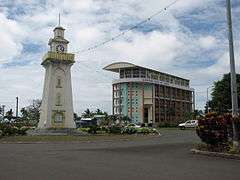Olaf Frederick Nelson


Ta'isi Olaf Frederick Nelson, (24 February 1883 – 28 February 1944), also known as Ta'isi O. F. Nelson, was a successful businessman and one of the founding leaders of the Mau movement for Samoan independence from colonial rule.
He was born on 24 February 1883 at Safune on the island of Savai'i, Samoa, and died in Apia on 28 February 1944. He was a successful planter, businessman and statesman. He was the son of a Swedish trader August Nilspeter Gustav Nelson and his Samoan wife,[1] Sinagogo Masoe, whose family had links to the Sa Tupua (a prominent chiefly family). His name Ta'isi is a matai chief title from his mother's family from the Savai'i village of Asau.
Nelson's early years saw him working in his father's business, and he became a successful merchant in his own right. He expanded his father's copra trading business throughout the islands, and by the time he was thirty five, Nelson was one of the wealthiest members of the Apia community. He was influential in both the Samoan and European communities.
Under German rule, when the country was called German Samoa (1900 - 1914), the colonial administrators treated Nelson as an equal. But after New Zealand seized control in 1914, Nelson was excluded and alienated by the new government. Despite being elected to the Legislative Council in 1924, he could do little as he and the other elected members were constantly overruled by the more numerous government appointees. This treatment turned Nelson into one of the major forces in the Samoan independence movement, known as the Mau.

In May 1927 Nelson founded a newspaper, the Samoa Guardian, to support its claims. In response to his growing public dissent, the New Zealand administration tried to brand Nelson as unscrupulous and a trouble maker.
The colonial administration's desperation to silence Nelson led them to exile him in January 1928, along with two other part-European members of the Mau. During his five years of exile, Nelson took his protests as far as the League of Nations in Geneva.
Six months after his return to Samoa, Nelson was sentenced to ten additional years in exile as well as eight months imprisonment in New Zealand. This was cut short in 1936, after Labour won the New Zealand general election in 1935. He returned to Samoa, and helped in the signing of the co-operation agreement between Samoan leaders and the New Zealand administration.
Death
Nelson died in 1944, and it was not until 1962 that his dream of Samoan independence was realised.
Legacy
Nelson's grandson Tupua Tamasese Tupuola Ta'isi Efi was the third prime minister of Western Samoa and from 2007 to the present he is, as Tui Atua Tupua Tamasese Ta'isi Efi, the Head of State of Samoa. The Nelson Memorial Public Library was donated to the Samoan people by the Nelson Family in Ta'isi's memory. His other Grandson Misa Telefoni Retzlaff (Hermann Theodor Retzlaff) was in parliament from 1988 to 2010, and the Deputy Prime Minister of Samoa from 2000 - 2010)
Bibliography
- ↑ Deryck Scarr (1990). The History of the Pacific Islands–Kingdoms of the Reefs. Macmillan Publishers. p. 265. ISBN 0-7329-0210-X.
O'Brien, Patricia "Ta'isi O. F. Nelson and Sir Maui Pomare: Samoans and Maori Reunited", Journal of Pacific History, 49:1 2014 http://www.tandfonline.com/toc/cjph20/current#.VDdbMl7rPG4
- Laracy, Hugh. 'Nelson, Olaf Frederick 1883 - 1944'. Dictionary of New Zealand Biography, updated 7 April 2006 Dictionary of New Zealand Biography
- ‘Guardians and Wards’ : (A study of the origins, causes, and the first two years of the Mau in Western Samoa.) Albert Wendt New Zealand Electronic Text Centre